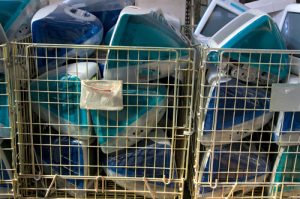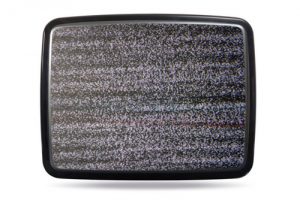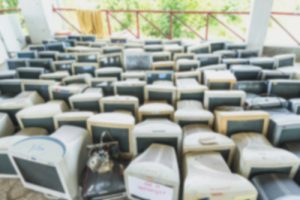 An update to the e-scrap recycling certification standard incorporates the latest version of the ISO 14001 standard, as well as approved amendments to the second e-Stewards iteration and other changes.
An update to the e-scrap recycling certification standard incorporates the latest version of the ISO 14001 standard, as well as approved amendments to the second e-Stewards iteration and other changes.

 An update to the e-scrap recycling certification standard incorporates the latest version of the ISO 14001 standard, as well as approved amendments to the second e-Stewards iteration and other changes.
An update to the e-scrap recycling certification standard incorporates the latest version of the ISO 14001 standard, as well as approved amendments to the second e-Stewards iteration and other changes.
 A Virginia-based processor has run into CRT glass management challenges in the wake of the collapse of Closed Loop Refining and Recovery.
A Virginia-based processor has run into CRT glass management challenges in the wake of the collapse of Closed Loop Refining and Recovery.
 When investigators reported last year on how new PCs were failing to meet their stated sustainability credentials, a reoccurring problem emerged: e-plastics weren’t being labeled correctly.
When investigators reported last year on how new PCs were failing to meet their stated sustainability credentials, a reoccurring problem emerged: e-plastics weren’t being labeled correctly.
 When an electronics recycling facility achieves R2 certification, stipulations of the standard extend to activities outside the walls of that building, according to a recent decision.
When an electronics recycling facility achieves R2 certification, stipulations of the standard extend to activities outside the walls of that building, according to a recent decision.
 Connecticut’s manufacturer-funded electronics recycling law has boosted recycling volumes and reduced municipalities’ disposal costs, but changes could improve the program, a report says. Continue Reading
Connecticut’s manufacturer-funded electronics recycling law has boosted recycling volumes and reduced municipalities’ disposal costs, but changes could improve the program, a report says. Continue Reading
 Long lines fail to deter residents from participating in a collection event, and one community sets up curbside e-scrap collections.
Long lines fail to deter residents from participating in a collection event, and one community sets up curbside e-scrap collections.
Continue Reading
 Scotland authorities fine a man for attempting to export e-scrap to Nigeria, and Hong Kong will charge fees to electronics importers to pay for end-of-life recycling services. Continue Reading
Scotland authorities fine a man for attempting to export e-scrap to Nigeria, and Hong Kong will charge fees to electronics importers to pay for end-of-life recycling services. Continue Reading
 New Jersey Gov. Chris Christie signed a bill overhauling the state’s e-scrap program. It was identical to legislation he pocket vetoed in 2016.
New Jersey Gov. Chris Christie signed a bill overhauling the state’s e-scrap program. It was identical to legislation he pocket vetoed in 2016.
 A nonprofit group buys California-based Isidore Electronics Recycling, and two lawmakers think 2017 may be the year a “right to repair” bill passes in Minnesota.
A nonprofit group buys California-based Isidore Electronics Recycling, and two lawmakers think 2017 may be the year a “right to repair” bill passes in Minnesota.
 Washington’s collection numbers continue their downward trend, and curbside e-scrap collection comes to an end in a South Carolina community.
Washington’s collection numbers continue their downward trend, and curbside e-scrap collection comes to an end in a South Carolina community.
